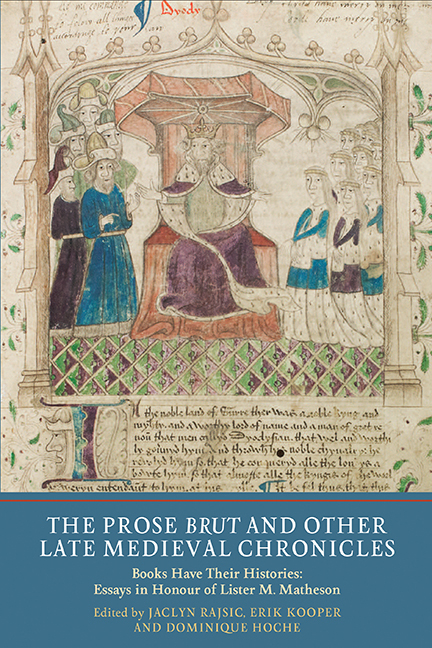 The Prose Brut and Other Late Medieval Chronicles
The Prose Brut and Other Late Medieval Chronicles Book contents
- Frontmatter
- Dedication
- Contents
- List of Plates
- List of Contributors
- Acknowledgements
- Curriculum Vitae of Lister M. Matheson
- Introduction
- A Memoir: The Whole Haggis: Lessons From the Work of Lister M. Matheson
- Part I Uses of History
- Part II The Prose Brut
- Part III Receptions and Afterlives of Late Medieval Chronicles
- Index of Manuscripts Cited
- General Index
- Tabula in Memoriam
A Memoir: The Whole Haggis: Lessons From the Work of Lister M. Matheson
Published online by Cambridge University Press: 05 July 2016
- Frontmatter
- Dedication
- Contents
- List of Plates
- List of Contributors
- Acknowledgements
- Curriculum Vitae of Lister M. Matheson
- Introduction
- A Memoir: The Whole Haggis: Lessons From the Work of Lister M. Matheson
- Part I Uses of History
- Part II The Prose Brut
- Part III Receptions and Afterlives of Late Medieval Chronicles
- Index of Manuscripts Cited
- General Index
- Tabula in Memoriam
Summary
Without knowing if Lister worked on the letter h for the Oxford English Dictionary or the Middle English Dictionary, there is no way of knowing if he could have worked on the word haggis. According to the Middle English Dictionary, it is first attested in English around 1400. Here is a seventeenth-century definition, from Gervase Markham's English House-Wife: ‘This smal oat-meale mixed with blood, and the Liver of either Sheepe, Calfe, or Swine maketh that pudding which is called the Haggas or Haggus, of whose goodnesse it is in vaine to boast, because there is hardly to be found a man that doth not affect them.’
One thing that lovers of haggis and lovers of medieval chronicles or historical linguistics have in common is that they seem to have a hard time understanding why others might not share their enthusiasm. But this is not the only reason to start with haggis. Nor is it just a matter of indulging in Scottish stereotyping – although Lister liked and cooked a fine haggis himself.
But to take ingredients that are not as easy to use as others, or might seem bland in isolation, and to make something not just distinctive and nourishing, but really tasty, out of them – that is not a bad description of Lister's scholarship, although he did not have to render the constituent elements unrecognizable in the process of preparing them for consumption. A first lesson to learn – from haggis and from Lister Matheson – is that nothing from a sheep or a surviving element of medieval literate culture need be dismissed out of hand as useless or valueless.
After working at the Oxford English Dictionary and completing his Ph.D. at Glasgow in 1978, Lister came to the University of Michigan and the Middle English Dictionary, where he cultivated the lexicographer's habits of attention to detail, a wide sense of the possibilities of usage, alertness to preconceptions and healthy skepticism towards received wisdom. Some of his earliest publications were on ‘ghost words’.
These habits served him well in his years of work on the huge, motley corpus of manuscripts of the Middle English Prose Brut, which thanks to him we now know survives in over 180 manuscripts representing over 200 medieval texts in a fabulous variety of versions and subversions.
- Type
- Chapter
- Information
- The Prose Brut and Other Late Medieval ChroniclesBooks have their Histories. Essays in Honour of Lister M. Matheson, pp. 7 - 12Publisher: Boydell & BrewerPrint publication year: 2016


